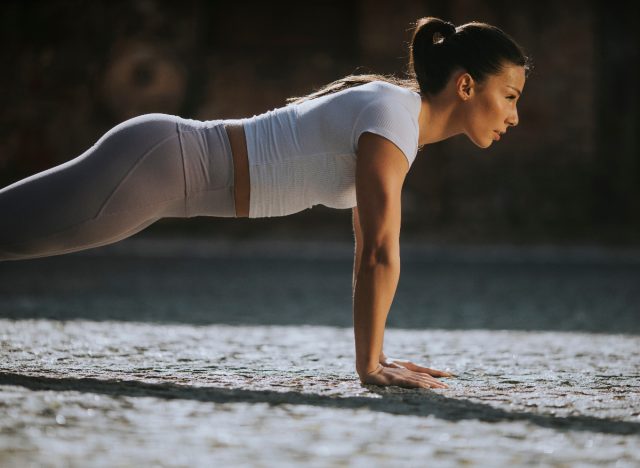Share this @internewscast.com
For some, carving out time in an already jam-packed schedule to exercise can be a major struggle. Others may be more consistent kicking off every morning with a workout or setting aside 10 minutes throughout the day for invigorating “movement snacks.” Whatever the case, you may find yourself wondering how often you really need to exercise in order to reap the rewards of your efforts. Because, let’s be honest, your workout time is precious, and you don’t want all those pushups to go to waste! Well, get excited, because a 2023 study published in the European Journal of Applied Physiology, reveals the new “magic number” of days you need to exercise to see results—and it’s lower than you think.
Keep reading to learn more about how researchers discovered exercising just three days a week is enough to yield results, and when you’re finished, be sure to check out The #1 Daily Walking Workout for Women to Get Fit.
How often should you exercise to make your efforts count?

If you’re looking to boost your muscle strength, researchers from Edith Cowan University (ECU) found that exercising three days a week may very well be the new “golden ticket” number. You heard that right—you don’t need to push yourself (and your muscles!) by spending countless hours at the gym lifting weights seven days a week. Besides, that’s a surefire way to experience burnout.
To find these results, ECU researchers had participants complete a single three-second maximal eccentric bicep contraction, which is similar to gradually lowering a heavy weight (such as a dumbbell) from a bent arm to an extended arm. The participants were divided into two groups: Group 1 had to do a three-second contraction twice a week, and Group 2 had to complete the exercise three days a week. After a four-week timeframe, the researchers looked at the bicep strength of both groups. Individuals who completed the exercise two days a week did not experience any substantial changes, but the group who did the exercise three days a week had a noticeable boost in both concentric strength and eccentric strength. Essentially, the three-days-per-week group experienced a much greater increase in muscle strength.
Read Related Also: These 3 Somatic Exercises Can Help You Navigate the Depression and Grief That Comes With the Change of Seasons
Ken Nosaka, the study’s lead scientist, explained in a press release that these findings help enhance our understanding of how the human body reacts to exercise, along with how individuals can use this beneficial, newfound knowledge in their own workouts. “Our previous work has shown regular, shorter exercise is more beneficial than one or two big training sessions in a week. Now, we have a clearer idea of where the tipping point is where you start to see meaningful benefits from such a minimal exercise,” Nosaka explained. “These new results suggest at least three days a week are required, at least for the single three-second eccentric contraction training.”
While three days is the minimum you should work out to improve strength, aiming for five days is even better. Study participants who performed the exercise five days a week saw more than a 10% increase in strength compared to the three-day group.
How can you work these findings into your own fitness routine?

Now that we have the research part of the equation covered, how can you use this knowledge in your own fitness regimen? Well, know that a little bit can certainly go a long way. “Of course, more studies are needed to confirm this, but our recent studies show the importance of accumulating small amount of exercise as frequently as possible in a week,” Nosaka noted. “It is important to note that even a very small amount of exercise can make a difference to our body if it is performed regularly.”
In addition, be sure to prioritize the recovery process, and give your muscles the rest they need. This is a crucial step in the overall process and will ensure you see results. “Muscle adaptations occur when we are resting, so muscles need rest to improve their strength and their muscle mass,” Nosaka stressed.










